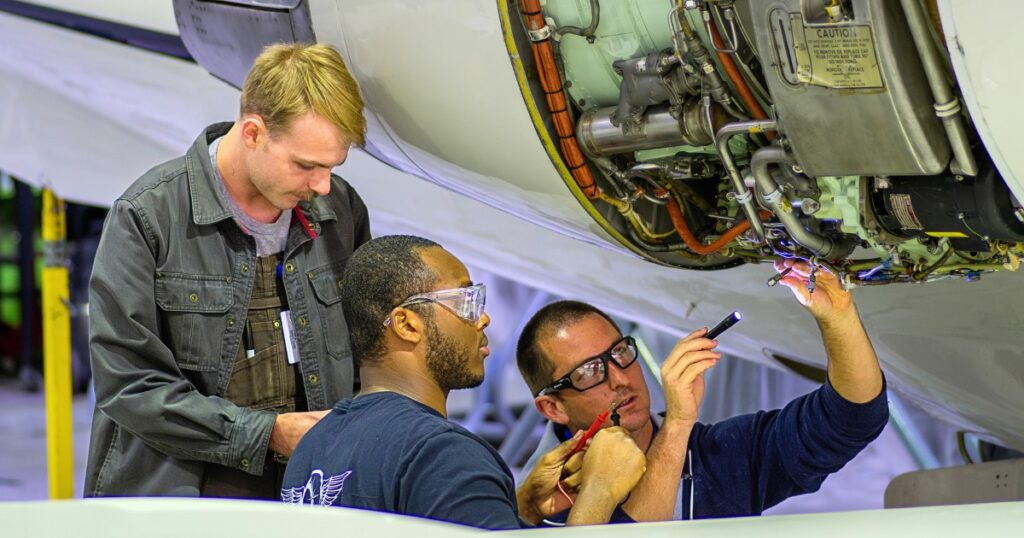For Bradon Losapio, aviation runs in the family. His great-grandfather helped design the Lancaster Bomber, and his grandfather worked on the Space Shuttle program. Inspired by his family’s history and personal love for aviation, he found EFSC’s Aviation Maintenance Technology (AMT) program to be a perfect fit.
“We have a strong reputation with a lot of local and nationally recognized companies,” said Losapio. “A lot of mechanics coming out of this program are getting leadership positions in very little time.”
An Airframe 4 student, Losapio emphasized the program’s high expectations. “The program makes us go above and beyond to ensure we become mechanics that are super successful.”
The aviation industry depends on highly skilled maintenance professionals to keep aircraft operating safely and efficiently. At EFSC, the Aviation Maintenance Technology (AMT) program trains future aviation mechanics to meet the industry’s high standards, with the ability to work on everything from airplanes and power turbines to rockets and spacecraft. This program is not for the faint of heart — it demands excellence, discipline, and hands-on mastery of complex systems.
Aviation Program Director Rick McKee brings decades of real-world expertise, having worked on a variety of aircraft throughout his 20-year career in the U.S. Air Force. His time in the military gave him a comprehensive understanding of multiple aircraft systems. This rare advantage allows him to train students beyond a single specialization.
The Growing Demand for Aviation Technicians
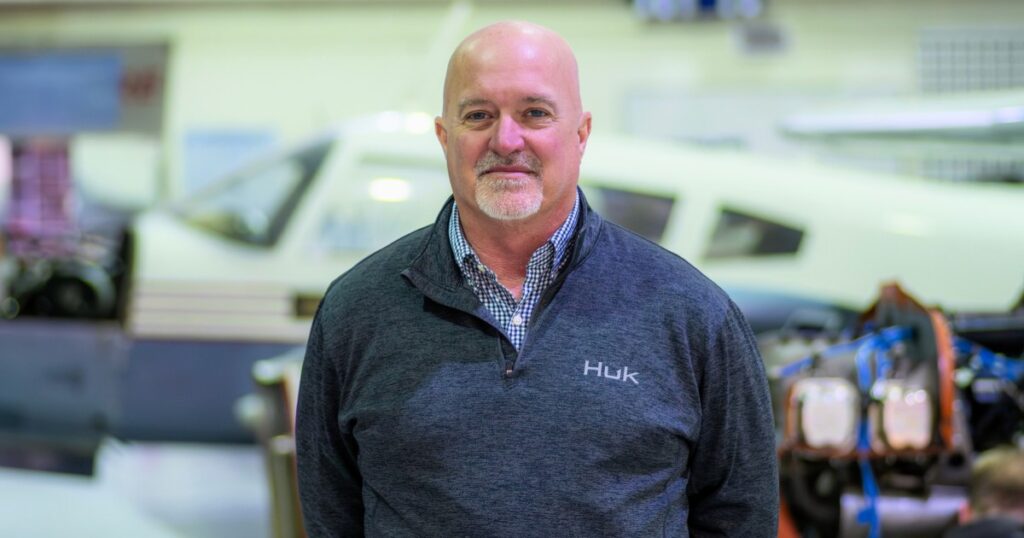
With the U.S. aviation industry facing a critical shortage of skilled maintenance personnel, students who complete this program are in high demand. Boeing’s Pilot and Technician Outlook 2024-2043 predicts that 716,000 new maintenance technicians will be needed globally in the next 20 years.
Per McKee: “As air travel rebounds to pre-pandemic levels, companies are actively seeking well-trained mechanics, making now the perfect time to enter the field.”
This demand is particularly strong in Florida, where the Space Coast’s aerospace industry is thriving. Companies such as Desault, Northrop Grumman, SpaceX, and Boeing are expanding their operations and seeking skilled maintenance professionals.
“Northrop Grumman is building a new facility,” said McKee. “They’re going to hire 200-300 people in the first round, and an additional 1,800 in their second round.”
There are three primary ways to become an aircraft mechanic: through serving in the military, working with an aviation company for at least 36 months, or attending an FAA-certified Part 147 school, like the one offered at Eastern Florida State College.
“Part 147 allows us to teach the federal aviation and administration standards in accordance with FAA,” explained Rick McKee. “After two years, students can test for their FAA certification, which is what gets them hired.”
EFSC’s Aviation Maintenance Technology program positions graduates for direct hiring opportunities, offering a competitive advantage in a fast-growing job market.
“Many of EFSC’s graduates that we have employed have grown their careers within our organization,” said John Wing, Senior Vice President of STS Aviation Services located in Melbourne, Florida. “Here at STS we have developed a great relationship with EFSC over the years. EFSC does a great job preparing their students for a seamless transition into the workplace.”
A Hands-On Approach to Excellence
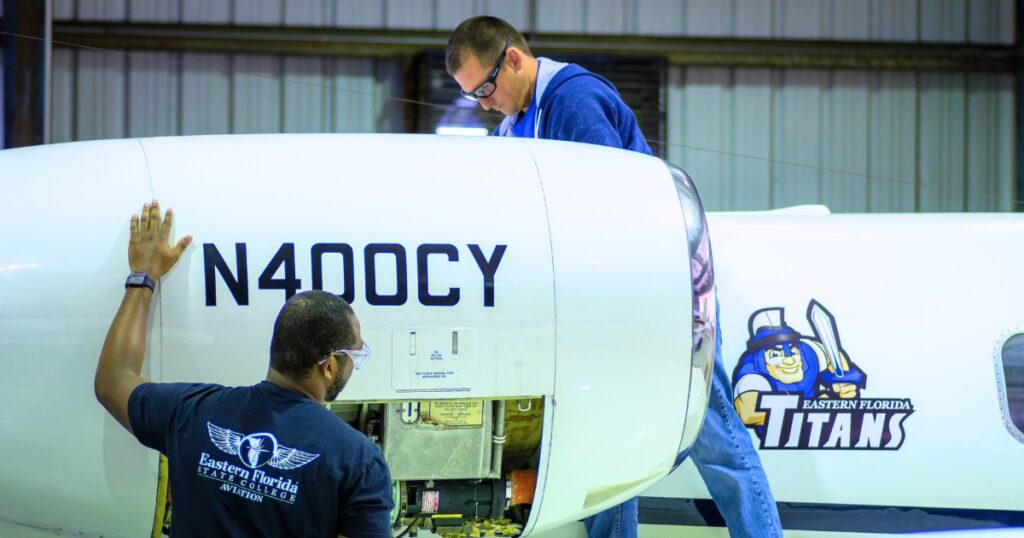
The EFSC aviation technology program simulates real-world aviation maintenance environments. It’s not just about technical skills — students must develop precision, time management, and teamwork to succeed.
Students must master mathematics, physics, FAA regulations, and mechanical skills while learning the FAA’s strict process-driven approach. Integrity is the heart of aviation technology — mechanics must follow procedures precisely, as lives depend on their work.
“Many people are flying on this aircraft. The person repairing it must understand all the laws and regulations,” added McKee. “It’s critical that the mechanic follows every step correctly.”
Christopher Zapko, who initially pursued an Aerospace Engineering degree at UCF, found it too theoretical. Zapko transitioned to EFSC’s aviation program, where he immediately immersed himself in math, physics, FAA regulations, and hands-on mechanics.
“I actually learned how to use my hands to accomplish tasks. It’s a really great place to learn the practical skills that you will need.” He was also impressed by the intuitive thinking that this program develops. “What you learn is how to think. It’s not just hands-on skills. You look at a plane and figure out what part of the plane you need to work on.”
Overcoming Challenges & Expanding Career Options
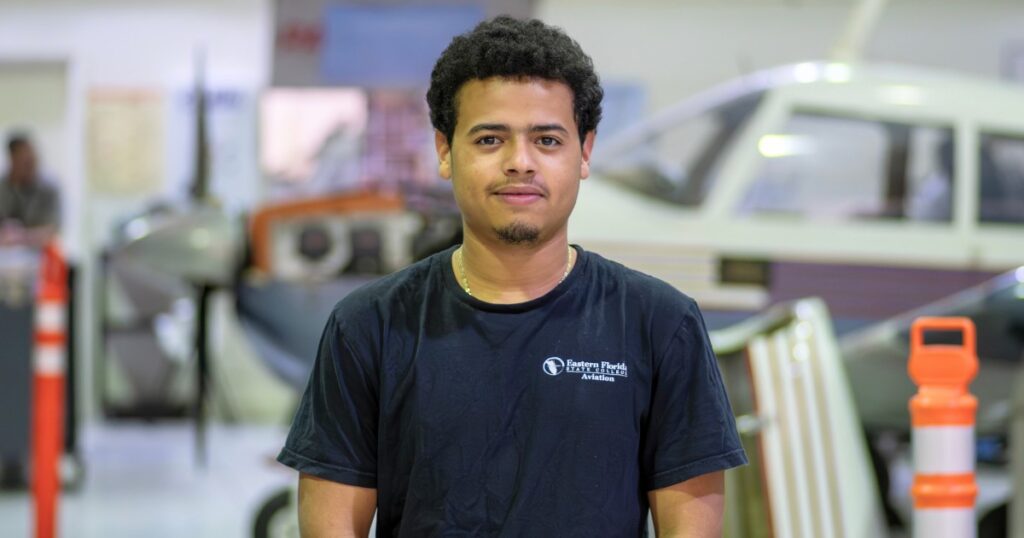
Already working in the aviation industry, Ruben Jose Lasada joined EFSC’s program to expand his career opportunities. He currently works at Ember Executive Jets as an assembly line technician, installing avionics and performing final inspections on private jets.
Lasada enjoys the daily challenges the program presents, as instructors push students to meet FAA standards. “Every day you get a new fold in your brain… You’re always fighting for that peak performance.”
His biggest hurdle was the math portion of the general studies curriculum. Initially, it prevented him from completing the program on his first attempt. However, instead of giving up, he persevered and re-enrolled, proving his dedication.
“There’s a lot of people that will run into a problem like that and just give up, but I decided to keep going, and now I’ve made it halfway through the program and almost into my second certification.”
Looking ahead, Lasada hopes to transition into the aerospace or drone industry. Using his A&P certification, he will explore opportunities in satellite and space technology. “With your A&P, the sky’s the limit.”
The Future of EFSC’s Aviation Program
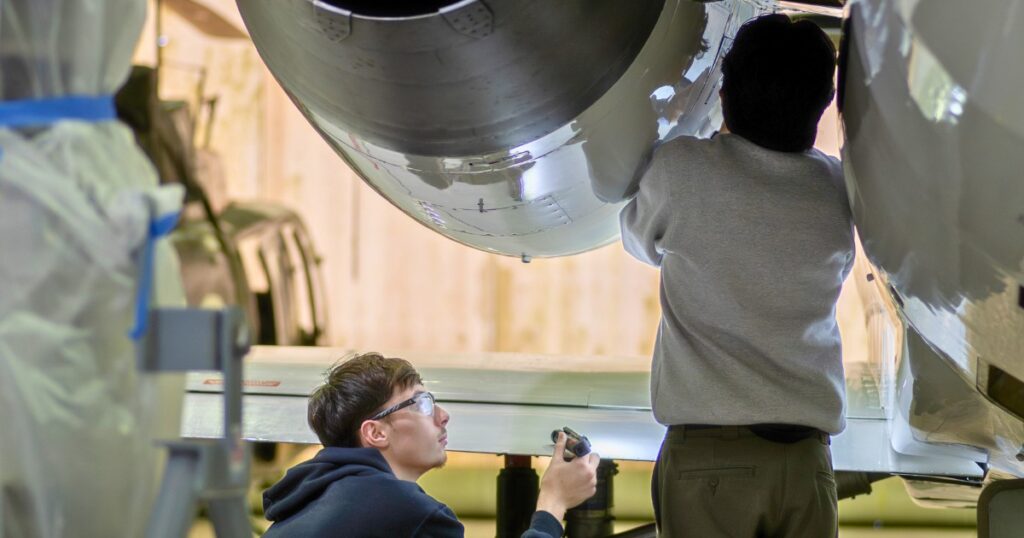
With the increasing demand for aviation mechanics, EFSC plans to expand its facility during a future move from the Melbourne International Airport onto the EFSC Titusville Campus. This transition will increase the space of the facilities from 15,000 sq.ft. to 30,000 sq.ft. and offer a flight simulator to teach students how to move an aircraft into the hangers.
“We are all very excited about the amazing changes happening on Eastern Florida’s Titusville Campus with our new and expanding Aerospace Center of Excellence (ACE),” said college president Dr. Jim Richey. “We are completely re-inventing ourselves to be in a better position to meet and exceed Florida’s future aerospace needs for high quality training and education.”
The new facility is expected to be finished by February 2026, expanding the reach of the program and enhancing relationships with existing aviation and aerospace industries in that area.
“The ever-increasing demand for skilled aviation mechanics on the Space Coast has created an exceptional opportunity for those seeking high-earning, fulfilling positions with a promising future,” continued Dr. Richey. “Our AMT program is one of the best and most affordable in the nation, and with the upcoming expansion of our facilities, we will be able to continue to produce the highly skilled Aviation Mechanics required to meet industry needs.”
- ‘The Sky’s No Limit’ for Graduates of EFSC’s Aviation Technology Program - April 16, 2025
- CNC Machining: A Pathway to Careers in Manufacturing and Engineering - March 5, 2025
- A ‘Cooler’ Future: Fast-Track Your Career with EFSC’s 1-Year HVAC/R Program - January 22, 2025

